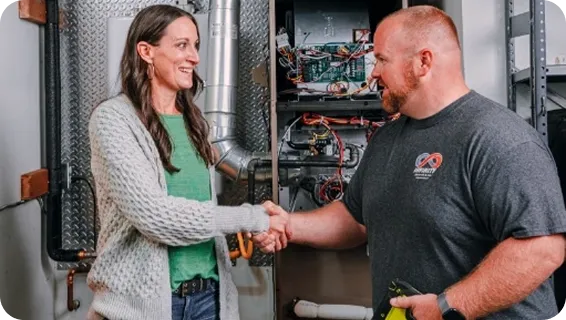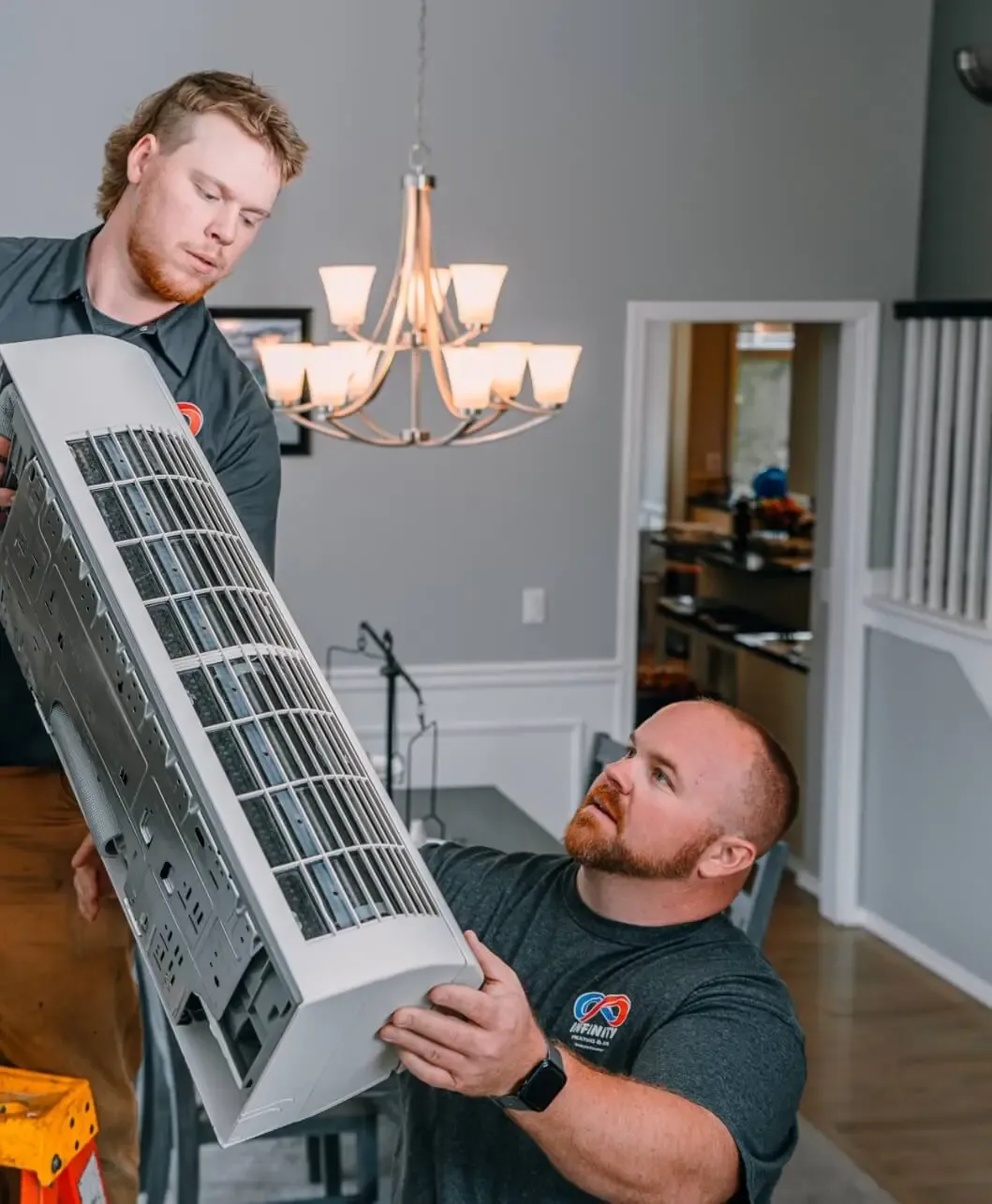
Coil Cleaning: Your AC’s Secret to Better Air
Boost AC efficiency & air quality! Discover the secrets of AC coil cleaning, DIY tips, and when to call experts.
.webp)
Why Clean Coils are Your AC’s Best Friend
AC coil cleaning is essential maintenance that involves removing dirt, dust, and debris from your air conditioner’s evaporator and condenser coils to restore optimal performance and efficiency.
Quick AC Coil Cleaning Overview:
- What to clean: Evaporator coils (indoor) and condenser coils (outdoor)
- When to clean: At least once per year, ideally in spring
- Tools needed: Soft brush, coil cleaner, garden hose, fin comb
- Safety first: Always turn off power at the circuit breaker
- Benefits: Up to 25% efficiency improvement, lower energy bills, better air quality
Picture stepping into your home on a sweltering Northwest Washington day, expecting cool relief, only to find your AC struggling. The culprit is often surprisingly simple: dirty coils.
Your AC works through a heat exchange process where clean coils efficiently absorb heat from your indoor air and release it outside. When coils get clogged with dust, pollen, and debris, this process breaks down.
The impact is significant: dirty coils can cause your equipment to use up to 37% more energy than clean systems, while cooling capacity drops by as much as 30%. It’s like paying for a luxury car but getting economy performance.
In Northwest Washington’s unique climate—with heavy pollen seasons and coastal moisture—your AC coils work overtime. Regular cleaning isn’t just maintenance; it’s the secret to consistent comfort and lower energy bills.
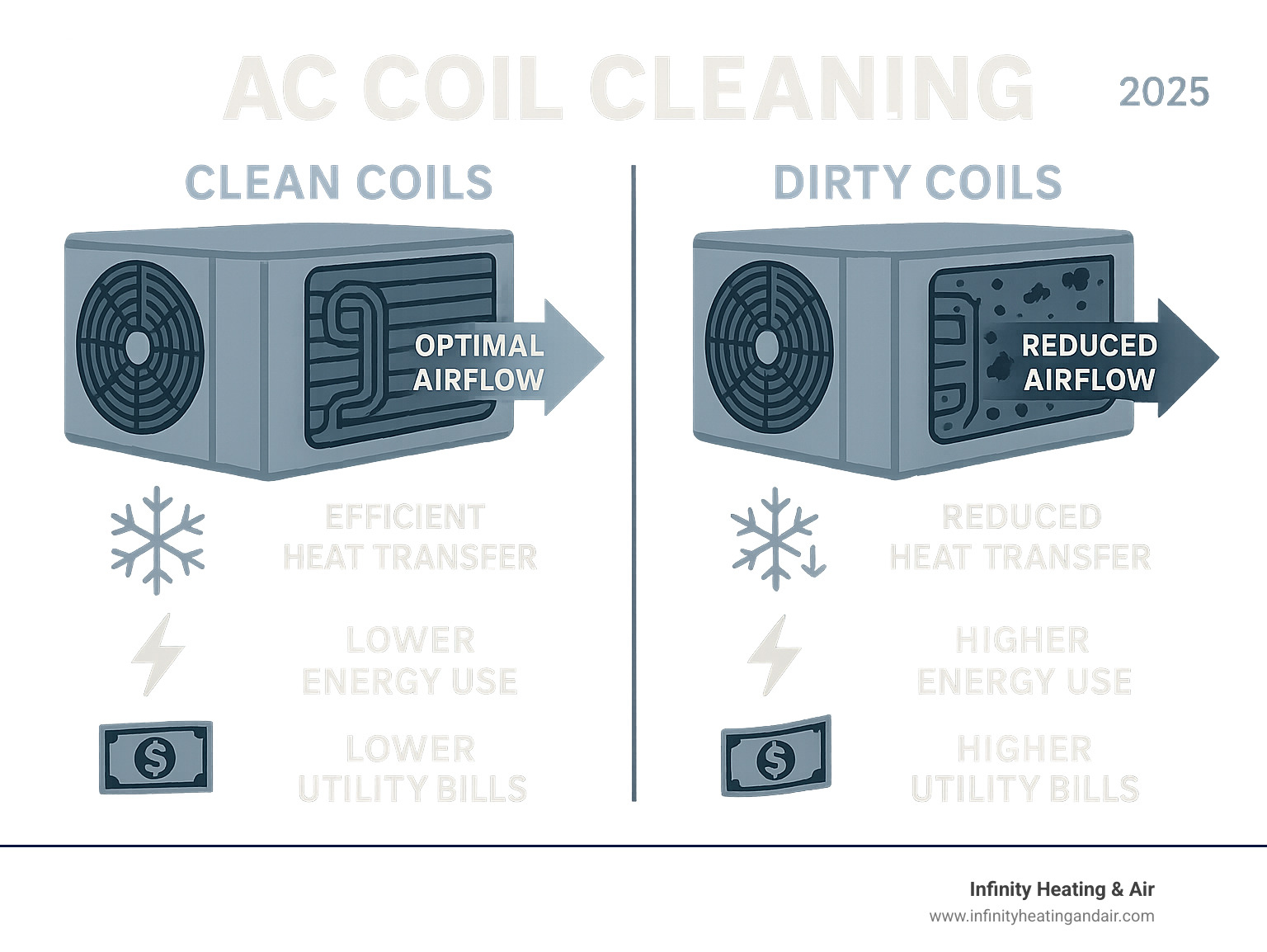
The Anatomy of Your AC: Understanding Evaporator and Condenser Coils
Your air conditioner relies on two sets of hardworking coils. Understanding how they work together helps you appreciate why AC coil cleaning is so crucial for your Northwest Washington home’s comfort.
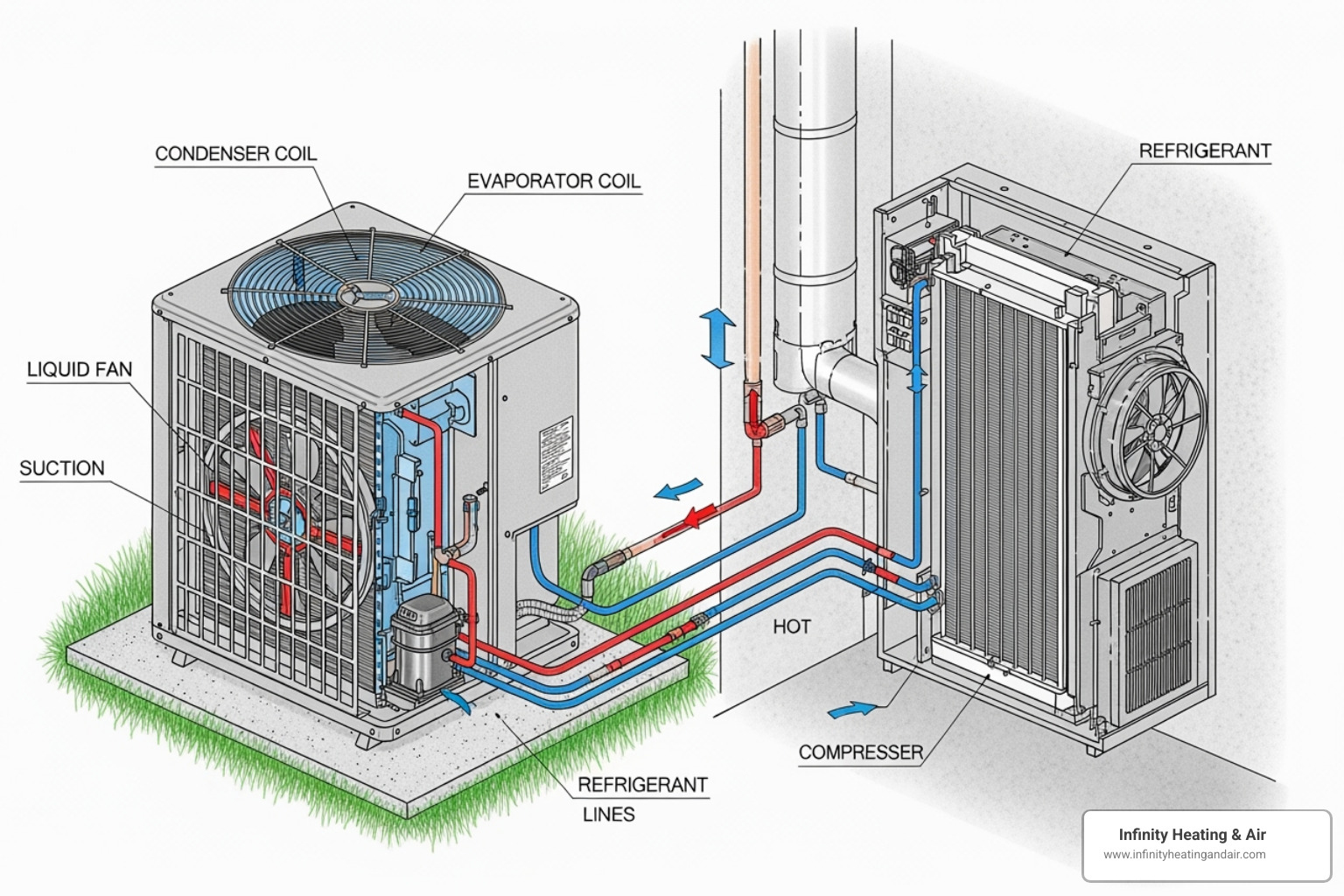
Think of your AC system as a relay team where refrigerant carries heat from inside your home to the outdoors. The evaporator coils and condenser coils are the two star players in this cooling relay.
Evaporator Coils
Your evaporator coils are located indoors, typically inside your air handler or furnace. Their job is heat absorption.
As warm air from your home flows over these cold coils, the refrigerant inside soaks up heat and humidity. This process cools your air and removes moisture, which collects in a drain pan and flows away through a drain line, leaving you with cooler, less humid air.
Condenser Coils
Your condenser coils are in the large unit outside your home. Their job is heat dissipation—releasing all the captured indoor heat into the outside air.
The now-hot refrigerant flows through the condenser coils while a fan blows air across them. This process releases the heat, allowing the refrigerant to cool down and return indoors to absorb more heat.
Both coil types are made of copper tubing with delicate aluminum fins. These fins multiply the surface area for heat exchange, making the process highly efficient.
However, these same fins can easily become clogged with dust, pollen, and debris. When that happens, the heat exchange process struggles, and your comfort suffers. That’s why regular AC coil cleaning transforms your system from a struggling underperformer back into the cooling champion your Northwest Washington home deserves.
Spot the Signs: Is It Time for an AC Coil Cleaning?
Your air conditioner will give you hints when it’s not performing its best, and dirty coils are often the culprit. Recognizing these warning signs can save you from sweltering days and high energy bills.

The most obvious sign is reduced cooling—your AC runs, but your home still feels warm. You might also notice weak airflow from your vents, as clogged evaporator coils force your system to struggle to push air through.
Another sign is higher energy bills. When coils are dirty, your AC works overtime. Systems with dirty coils can use up to 37% more energy than clean ones.
Keep an eye out for icing over on your evaporator coils. When dirt insulates the coils, they can’t absorb heat properly, causing moisture on the coil surface to freeze.
Musty odors from your vents are another red flag. The combination of moisture and trapped dirt creates a perfect breeding ground for mold and bacteria.
You might hear your system showing strain through unusual noises or running for long periods without cycling off. This extra effort reduces cooling capacity by up to 30% and wears down components, while poor indoor air quality results from circulating dust and allergens.
How Often to Clean Coils
For most Northwest Washington homes, annual cleaning is ideal, preferably in spring before the cooling season begins. However, our Pacific Northwest environment can affect this. Heavy pollen seasons, excess dust, or pet dander may require more frequent attention. A professional inspection during your annual maintenance can help determine the best schedule for your home.
The Dangers of Dirty Coils
Ignoring dirty coils isn’t just about comfort; it’s about protecting your investment. System inefficiency is only the beginning. When your AC constantly struggles against clogged coils, it leads to increased wear and tear on critical parts like the compressor.
This can cause compressor failure—one of the most expensive HVAC repairs. Dirty coils cause operating pressures and temperatures to rise, breaking down lubricants and damaging the compressor.
Microbial growth also thrives in the moist, dirty environment of neglected coils, circulating mold spores and bacteria throughout your home and impacting your family’s health.
These problems often lead to costly repairs or premature system replacement. Regular AC coil cleaning is preventive medicine for your HVAC system—a small investment that prevents major headaches.
For comprehensive care that keeps these problems at bay, check out More info about our AC Maintenance services.
Your Step-by-Step Guide to Cleaning AC Coils
Ready to give your AC the TLC it deserves? AC coil cleaning is a satisfying home maintenance task that delivers immediate results. But first, let’s cover how to do it safely and effectively.
Safety Precautions
Safety is essential when working on AC units. The most critical step is to turn off the power completely at the circuit breaker and the outdoor disconnect box. Always wear safety glasses, chemical-resistant gloves, and long sleeves. A respirator is also a good idea if you’re in a tight space.
Tools and Materials
Gathering the right tools makes the job much smoother. You’ll need:
- A soft-bristled brush
- A fin comb
- Commercial coil cleaner (no-rinse for indoor, rinse-off for outdoor)
- A garden hose with a spray nozzle
- A spray bottle
- A wet/dry shop vacuum
- A screwdriver set
- Plastic sheeting and paper towels
Common Mistakes to Avoid
Avoid these common DIY mistakes to prevent expensive damage:
- Using high-pressure water: A pressure washer will destroy the delicate aluminum fins. Use a garden hose on a gentle setting.
- Using harsh chemicals: Household cleaners can corrode coils. Only use products specifically designed for AC coils.
- Bending the fins: Be gentle. If you accidentally bend any fins, carefully straighten them with a fin comb.
Step-by-Step: Condenser AC Coil Cleaning
Your outdoor unit takes a beating from the elements, so it’s often the dirtiest.
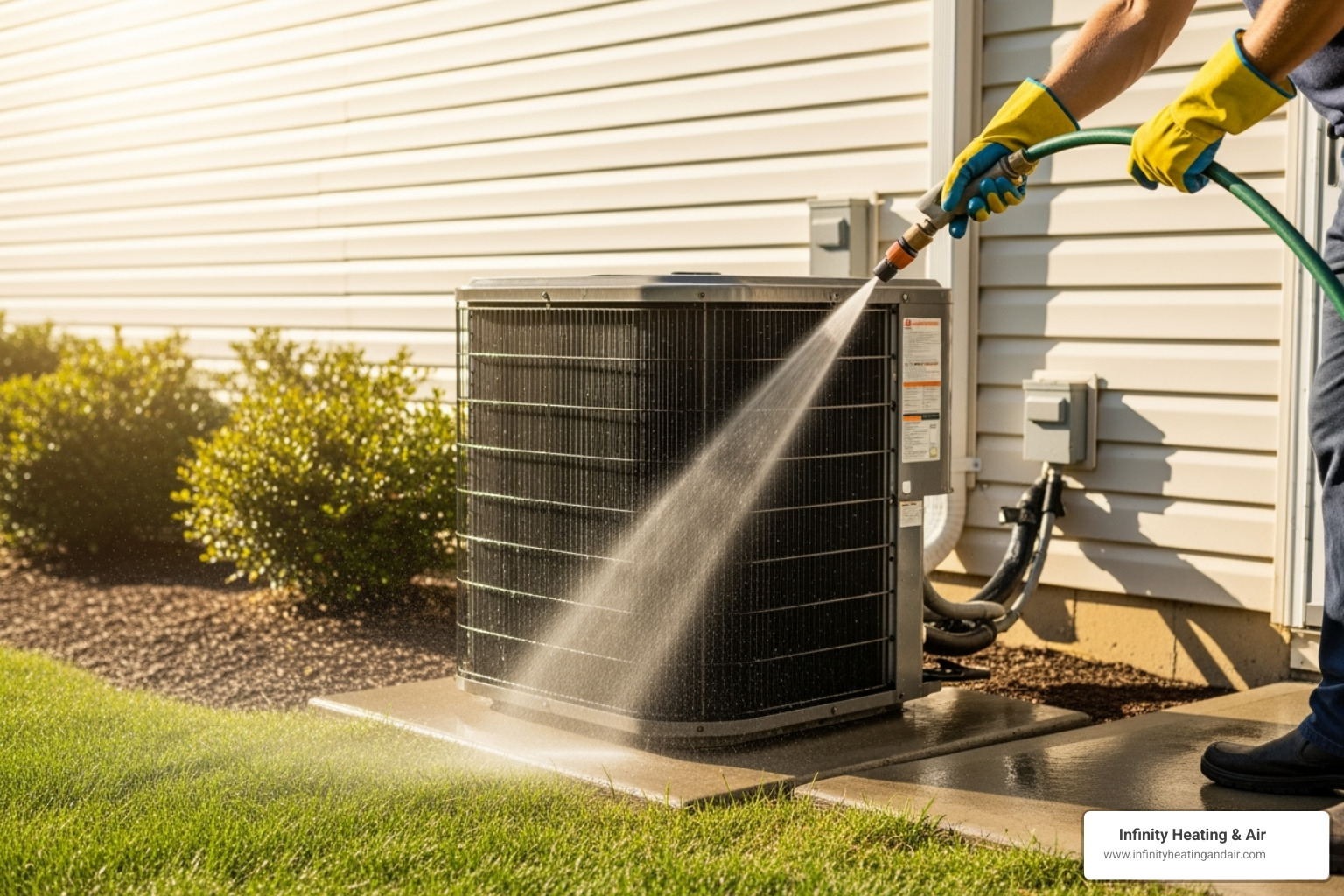
- Turn off the power at the breaker and the outdoor disconnect box.
- Clear away debris like leaves and grass from around the unit.
- Remove the outer casing (top grille and side panels). Be gentle with any attached fan wires.
- Brush off loose dirt from the coils using your soft brush or shop vacuum.
- Straighten any bent fins with your fin comb.
- Spray coil cleaner evenly over the coils and let it sit for 5-10 minutes.
- Rinse from inside out using gentle water pressure. This pushes dirt away from the coils. Rinse until the water runs clear.
- Air dry completely before reassembling the unit and restoring power.
Step-by-Step: Evaporator AC Coil Cleaning
Indoor coils require a more delicate touch since they’re near electrical components.

- Shut off power at the main breaker.
- Locate your indoor unit and remove the access panel.
- Protect surrounding electronics with plastic sheeting.
- Clear loose debris from the coils with a soft brush or vacuum, working in the direction of the fins.
- Apply no-rinse foam cleaner evenly over the coil surfaces. The foam will liquefy grime and drip into the condensate pan to drain away.
- Check the condensate drain pan and line to ensure they are clear. A cup of distilled water with a tablespoon of bleach can help prevent future mold growth.
- Allow coils to dry completely before reassembling the panel and restoring power.
For industry best practices, check out ACR, The NADCA Standard for coil cleaning. Following these guidelines ensures your AC coil cleaning meets professional standards.
DIY vs. Professional Service: When to Call in the Experts
AC coil cleaning can be a rewarding DIY project, but it’s not always simple. It’s important to understand the risks before you begin.
DIY Risks
- Damaging Fins: The aluminum fins on coils are extremely delicate and easily bent, which restricts airflow and reduces efficiency.
- Electrical Hazards: AC units contain high-voltage components. Even with the power off, capacitors can hold a dangerous electrical charge.
- Incomplete Cleaning: Without professional-grade equipment, it’s easy to miss deeply embedded grime, especially on hard-to-reach indoor coils.
- Component Damage: Using the wrong cleaners or too much water pressure can corrode coils and damage other sensitive parts.
Benefits of Professional Cleaning
When you hire a professional for AC coil cleaning, you get expertise and peace of mind. Technicians use specialized tools and industrial-grade cleaners for a deep clean that DIY methods can’t match.
More importantly, a professional performs a thorough inspection, spotting potential issues like refrigerant leaks or worn components before they become major problems. It’s a full check-up for your system.
When to Call a Professional
Consider calling a professional in these situations:
- Heavily soiled coils that haven’t been cleaned in years.
- Frozen coils, which often signal a deeper problem than just dirt.
- A suspected refrigerant leak (indicated by hissing sounds or chemical smells).
- Lack of confidence or comfort working around electrical systems.
The bottom line is simple: whether you tackle AC coil cleaning yourself or trust it to professionals like us at Infinity Heating & Air, what matters most is that it gets done regularly. Your coils just want to be clean so they can keep you comfortable.
Frequently Asked Questions about AC Coil Cleaning
We get many questions from our Northwest Washington neighbors about AC coil cleaning. Here are answers to the ones we hear most often.
How does cleaning AC coils impact indoor air quality?
Your AC’s evaporator coils act like an air filter, trapping dust, pollen, pet dander, and other airborne particles. When dirty and moist, they become a breeding ground for mold and bacteria, which then get blown through your home.
Regular AC coil cleaning removes these contaminants. This helps eliminate musty odors and creates a healthier living environment, which is especially important for family members with allergies or respiratory issues. Clean coils mean cleaner air.
Want to explore more ways to improve your home’s air? Learn about our Indoor Air Quality solutions at Infinity Heating & Air.
What are the main benefits of regular coil cleaning?
Regular AC coil cleaning offers several key benefits:
- Improved efficiency: Clean coils can boost your system’s efficiency by up to 25%.
- Lower energy bills: Higher efficiency means your AC uses less electricity to cool your home.
- Extended AC lifespan: Reducing strain on components like the compressor helps prevent premature failure.
- Better cooling performance: Clean coils ensure consistent and effective cooling.
- Fewer emergency service calls: Proactive maintenance helps you avoid unexpected breakdowns.
Can I use household detergent to clean my AC coils?
We strongly advise against using household detergents for AC coil cleaning. They often leave behind a sticky residue that attracts more dirt, making your problem worse over time.
Many household cleaners also contain harsh chemicals that can corrode the delicate copper tubing and aluminum fins in your system. It’s always best to use commercial coil cleaners specifically formulated for HVAC systems. For indoor evaporator coils, a no-rinse foam cleaner is ideal. Using the right products is safer and more effective.
Conclusion: Ensure Endless Comfort with Clean Coils

Imagine walking into your home on a hot day to a wave of cool, fresh air. Your AC runs quietly, your energy bills are manageable, and the air feels clean. This is the reality when you make AC coil cleaning a priority.
As we’ve covered, clean coils lead to better efficiency, lower energy bills, a longer AC system lifespan, and improved air quality. For your family’s health and comfort, these benefits are invaluable.
Here in Northwest Washington, with our heavy spring pollen and coastal moisture, regular cleaning is essential. Proactive maintenance like coil cleaning is always easier and more affordable than reactive repairs when something breaks down.
Whether you’re a DIY enthusiast or prefer to leave it to the professionals, the important thing is that it gets done. At Infinity Heating & Air, we’re passionate about helping Northwest Washington families create the perfect environment for living, where comfort is constant.
Don’t let dirty coils rob you of the comfort you deserve. Your future self (and your wallet) will thank you for taking action today.
Schedule Your AC Service Today

Endless Comfort
Starts Here
Our expert technicians are ready to serve you and your home.


